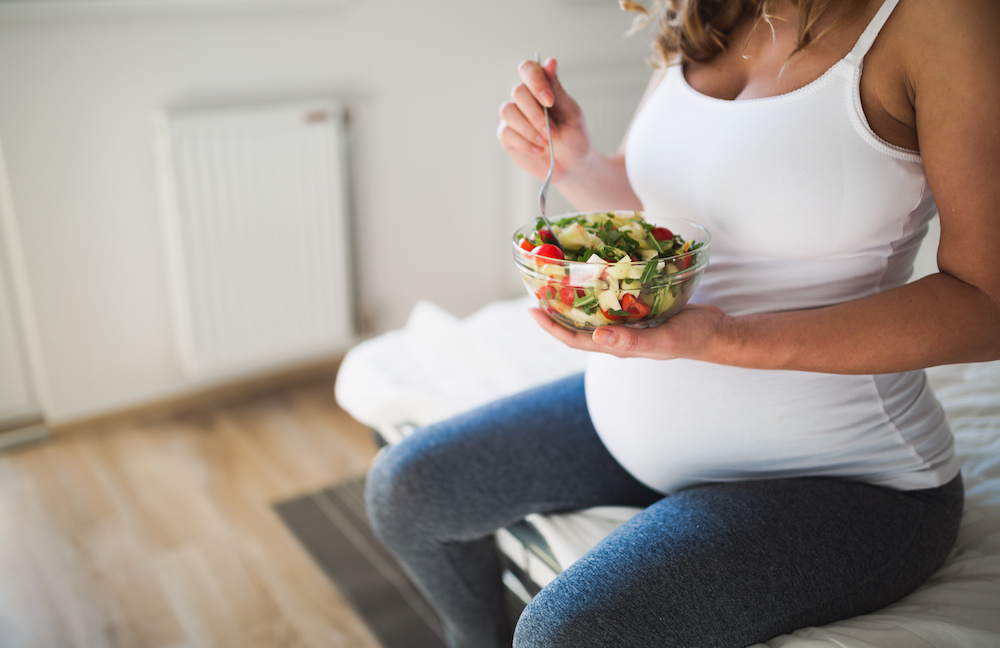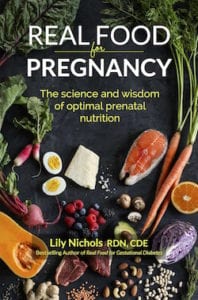
 Not only can pregnancy be challenging, but it can also be confusing. Eat this. Don’t eat that. Advice coming from everyone and in every direction, from your grandmother to your well-intentioned best friend. Even as a dietitian revisiting research is important to stay abreast on current recommendations particularly around pregnancy. A new book just hit the shelves by Lily Nichols, RDN, CDE entitled Real Food for Pregnancy: The science and wisdom of optimal prenatal nutrition which has just about every nutrition and pregnancy topic covered. This book is stout with information and over 900 research citations. Honestly, this book could serve as a textbook for any medical practitioner. Here are 3 key focuses the book covers:
Not only can pregnancy be challenging, but it can also be confusing. Eat this. Don’t eat that. Advice coming from everyone and in every direction, from your grandmother to your well-intentioned best friend. Even as a dietitian revisiting research is important to stay abreast on current recommendations particularly around pregnancy. A new book just hit the shelves by Lily Nichols, RDN, CDE entitled Real Food for Pregnancy: The science and wisdom of optimal prenatal nutrition which has just about every nutrition and pregnancy topic covered. This book is stout with information and over 900 research citations. Honestly, this book could serve as a textbook for any medical practitioner. Here are 3 key focuses the book covers:
Real Foods
Yes, the term “real foods” can be a bit confusing at first glance, but let me break it down for you. Nichols discusses real foods as nutrient dense, whole, and high quality foods. Throughout the book Nichols challenges conventional wisdom and practices with both traditional cultural traditions and current research trends. While I am a huge proponent of the whole, real foods approach over the highly processed foods readily consumed in the Standard American Diet, I also recognize the financial accessibility to all of the suggested foods in her book, for example grass feed meats, almond butter over peanut butter, and fresh foods over convenience of frozen or canned items. But, if you are familiar with budget shopping and have culinary skills you could navigate the suggestions on a budget.
Meal Plans
From delicious recipes for quiche and grain-free granola to homemade electrolyte drinks, Nichols provides solid recipes to help get someone started on eating more whole foods. Her meal plans are beautifully crafted, and for a person who enjoys a protein-focused diet (or perhaps needs to include more protein-type foods) this is a great start. Nichols places value on high-fat, nutrient-dense foods like nuts, seeds, avocados, and whole eggs to fill in nutrition gaps. When asked about her top 3 foods she’d recommend and why, Nichols shared this:
Eggs with yolks:
Tasty, easy-to-prepare, and packed with nutrition. With the exception of folks with an egg allergy, eggs should be a part of every prenatal diet. They provide protein, B-vitamins, choline, minerals, vitamins A, D, E, and K, and even the brain-building omega-3 fat known as DHA.
I’m gonna single out choline for a moment, because it’s too often left out of the conversation on prenatal nutrition. Choline is a relative to the B-vitamins (I like to call it “folate’s long lost cousin”) that’s absolutely crucial to brain development and the prevention of neural tube defects. Sadly most pregnant women don’t consume enough of it (94% of women don’t meet the recommended intake). Egg-eaters consume, on average, 2x more choline that non-egg eaters and aside from liver, eggs are the #1 richest source of choline. Some recent studies show that choline intake more than DOUBLE the current recommended intake is optimal for brain development. Choline is only found in the yolk, so be sure to consume the whole egg (the days of egg-white omelets are dead!).
Kale & Leafy Greens:
No prenatal diet is complete without leafy greens. They are some of the richest dietary sources of folate (the word folate comes from the word foliage, meaning leaves). Greens also provide minerals (including magnesium and potassium), fiber, vitamin C, beta-carotene, and many antioxidants. For optimal nutrient absorption, particularly of beta-carotene and other fat-soluble nutrients, it’s vital to consume vegetables with some fat. Luckily, that also makes them taste much better. Add some sauteed kale to your morning omelet, nosh on marinated kale salads, and throw a handful in a comforting bowl of soup.
Wild Salmon:
Omega-3 fats have gotten more attention in recent years for their important role in brain and vision development. The specific type that offers these benefits is called “DHA” and the number one source is fish that live in cold water, like wild salmon and sardines. These who types of fish are also naturally low in mercury, so you can safely consume it during pregnancy. Fish and seafood are also sources of iodine, zinc, iron, selenium, protein, vitamin B6, vitamin B12, and many other nutrients important during pregnancy. If broiled or grilled salmon isn’t your thing, consider making salmon cakes, or opting for salmon in your favorite tuna salad recipe.
Range of Information
The book covers all aspects of pregnancy, and Nichols expert background on diabetes shines through. She is also the author of the bestseller Real Food for Gestational Diabetes.
In addition to nutrition, Nichols covers exercise, sleep, mindfulness, and post-pregnancy challenges. This book covers it all!
Highly Recommended
After diving into this book I feel better as a practitioner to provide updated information. I would highly recommend this book for anyone planning a pregnancy. My only caution is for those struggling with a budget. There are many who simply cannot afford expensive ingredients, but this approach can be tailored towards people who need a more budget-friendly meal plan. For those on a budget I’d suggest adding in more beans, focusing less on pasture-raised or grass-fed items and more on the conventional counterparts, and focus on seasonal fruits and vegetables or canned alternatives. Nichols suggests doing the best that you can within your means while focusing on the most nutrient dense foods, such as beans, eggs with the yolk, and vegetables. If you are health conscience this book will resonate and answer questions you have pertaining to pregnancy. I’ll be sure to share this book with my all the soon-to-be-moms in my group, too!


Leave a Reply